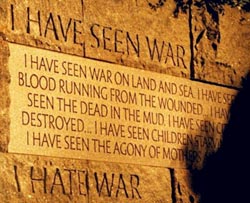As I have turned over in my mind the sermon from Sunday, I have reflected upon what it is to really rest- it goes far deeper than physical rest. As Marva Dawn so aptly points out, real rest is resting spiritually in God's grace and taking a break from trying to be God. It is resting emotionally, allowing God to heal us through relationship both with God (in solitude) and others (in community).
But it is the ideas of intellectual rest and social rest that have captured my imagination. Both Marva Dawn and Wayne Muller point out that we must rest from thinking and trying to solve problems, especially when the problems are big, life threatening ones like poverty, war. It is in the act of resting in God that one reaffirms God's presence and activity. It is in resting, too, that creativity and fresh perspective is given space to breath and exist. It is in this type of intellectual rest that social rest takes root: a person learns to trust in God's love that calls us precious just because we are created, and also learns to see others in this light. It's much harder to kill or oppress someone you love.
FDR Memorial:

Busyness, always rushing from one problem, challenge, crises, or issue headlong into the next one, seldom produces the results we long for. I read a heart rending reflection on the war in Lebananon. The writer, Linda Bales of the United Methodist General Board of Church and Society, talked of seeing a four year old Lebanese child dead in the street. How do we allow such things to happen?
At least part of the answer is that we are not intimately connected with the source of Love. Sabbath is a way of connecting with Love, of putting God at the head of all that we do, and for Christians, being formed into the image of Jesus Christ. If we were so connected, we would no sooner believe war is legitimate path to peace than we would believe that jumping off a cliff would solve all of our personal problems. Sabbath practice can bring a gentleness of spirit and a creative heart to whatever we are facing.
P.S.
Speaking of war not being a path forward to peace, and war not honoring God's love for all humanity, I am reminded of my favorite placard at the last anti-war protest I attended on the D.C. mall. If you are sensitive to profane language, stop reading now. The placard said "Bombing for peace is like f@#%ing for virginity."
Generally, I am not big into using profanity to express myself, but I have yet to think of a better way to say that one.
The connection with war also makes sense because "Shabbat" (Sabbath) is from the word "to cease." I think that has different implications from the word "rest" (which today mostly implies relaxation, sleep, etc.). Since anything can cease production -- the earth can lie fallow, nations can stop competing with each other -- the Sabbath is a good model for people's interaction with the world at large. I guess it's a more old-school way of saying, "Stop the violence, increase the peace!"
ReplyDeleteAnother thing I like is that God "shavat v'yinafash" (Exodus 31:17), which is usually translated as He "rested and was refreshed," but it has the word "nefesh," meaning "soul," which sort of connotes that God was "re-'soul'd." (This also seems different from the usual image of God being "tired" and needing a nap or something.) I think the concept of being "re-'soul'd" on the Sabbath is pretty cool. Maybe if nations could renew their souls, they would have a "fresh" perspective on things as well.